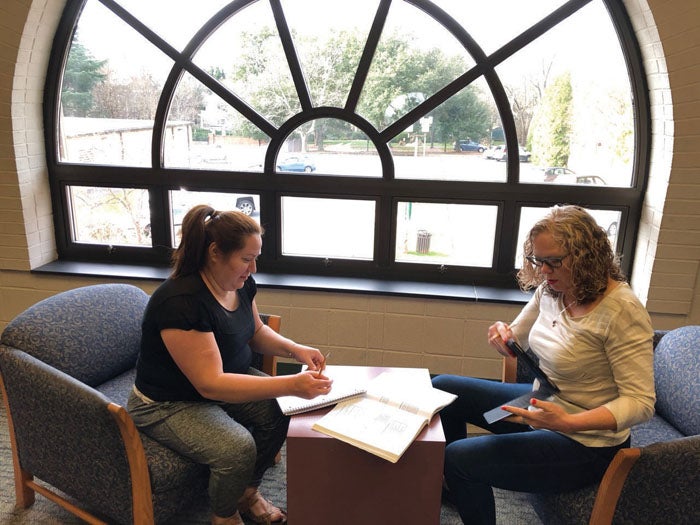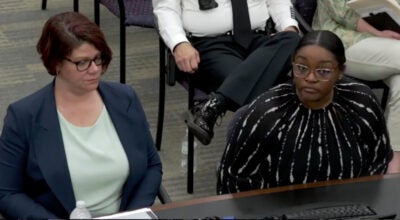Literacy Council moves on without United Way funding
Published 12:02 am Wednesday, January 22, 2020

- Maggie Blackwell/For the SALISBURY POST Susan Parker, who tutors three students twice a week, works with Gilma Portillo, left, at the Rowan Public Library as part of the Literacy Council, which has had to find creative ways to continue without United Way funding.
By Maggie Blackwell
After being a longtime recipient, The Rowan Literacy Council this year didn’t receive United Way funding and is organizing a new fundraiser so it can continue serving the community.
The council had been a United Way recipient since 1990.
“Our mission of eradicating illiteracy in Rowan County did not align with the 2019 campaign’s priorities of substance abuse, mental health, healthy lifestyles and basic needs,” said Executive Director K. C. Scott. “We are very appreciative of United Way’s past support and hope there’s an opportunity for partnership in the future.”
The fundraiser, on May 2, will be the “Kentucky Derby Hat-i-tude,” complete with mint juleps, awards for best dressed and other exciting race-day activities. The council also will continue to produce the popular Scrabble Scramble fundraiser.
When the Council was initially founded, its primary mission was to help adults over 16 years of age learn to read. Over the years, the needs of Rowan County have shifted dramatically, and the council has responded to those needs, said Don Doering, board president.
“We’re obviously super-stable and established, with continuous operation since our founding in 1976. We’re constantly expanding in response to the county’s needs and have more needs than we can fulfill,” Doering said.
Barry Hill, vice president of community impact, said that he believes the Literacy Council’s services are “definitely a benefit” to the community and that he hopes there’s no reduction in services to the community.
Hill said that organizations who didn’t previously meet the criteria for the United Way’s new community impact model were encouraged to partner with other organizations and develop a program that could be funded. A grant application from the Literacy Council was not selected by United Way volunteers.
With the United Way’s new model, grantees are free to have fundraisers, with some restrictions on workplace and corporate campaigns. There’s no blackout period, as was the case before the recent switch. Former funding recipients, including the Literacy Council, do not have face restrictions.
Through the energy of 52 active tutors, the council offers adult basic education, English as a second language, GED preparation and, through a partnership with Communities in Schools, elementary reading tutorships. The average elementary literacy learner improved 2.5 reading levels last year with the help of the council. Last year, six local residents gained their U.S. citizenship with the help of the Literacy Council.
The council has logged over 40,000 hours of volunteer tutoring. And many tutors have served over 10 years, with some serving as long as 30 years. The agency provides free training, materials and ongoing support for both students and tutors.
The council has proven to be an inspiration to other counties, with several others calling in the previous year and asking how to get a literacy program started.
A Rowan County needs assessment identified illiteracy as a key component in poverty. More than 18% of Rowan County residents live below the poverty line. And just under 13,000 residents of the county don’t speak English.
In response to the needs assessment, the council has identified areas for future growth. They include:
• Tutoring inmates in prison and helping with job placement for their release.
• Establishing a satellite office in predominantly Hispanic communities to offer English as a second language with no need for transportation to the library.
• Offering English as a second language to parents at Knox Middle School during the school day.
The Council has active partnerships with the Rowan County Library, Rowan Community College, Communities in Schools and the Rowan Salisbury School System.
Doering says literacy councils in other communities have more paid staff. Under the current Rowan model, all students are tutored by volunteer tutors. If a tutor goes on vacation, the student must wait. Paid staff can provide continuity in the case of absent tutors, helping students reach goals faster and opening spots for more students.
Today, the council has a waiting list of 15 students who have been fully vetted, registered and assessed.
“We’d love it if everyone who needed a tutor could be served immediately,” Scott said.
Each student in the Literacy Council program has a curriculum tailored specifically to his or her needs, as people come in with differing abilities and needs. Today the English as a second language program represents 13 counties: China, Cuba, the Dominican Republic, Egypt, El Salvador, Ethiopia, Guatemala, Honduras, Lao People’s Democratic Republic, Mexico, Ukraine, Vietnam and Yemen. About half of the English learners from other counties have a high school degree of higher and about 20% have a college degree from their country of origin.



